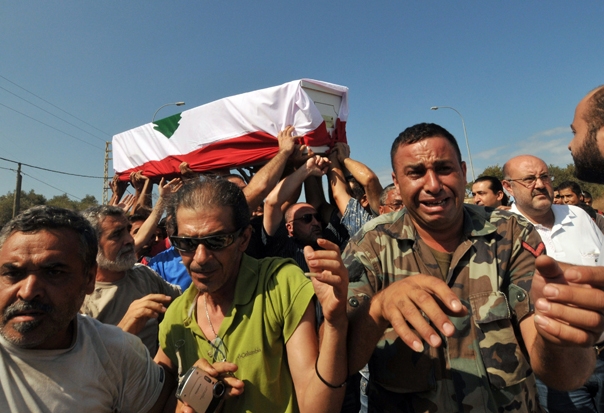Lebanon
The Beirut press corps gather to remember the murdered journalist Jim Foley. People stand for a minute’s silence, drink in hand. Below the balcony, the nightly Beirut traffic jam sends the sound of car horns floating upward. Before killing him, the so-called Islamic State emailed his family: ‘The scum of your society… are held prisoner by us, THEY DARED TO ENTER THE LION’S DEN AND WHERE [sic] EATEN!’ I always thought of the hardy band of foreign freelancers, of which Jim was a part, as the best of us. They venture into Syria without the cushion of a big news organisation behind them, often not knowing if they’ll even be able to sell anything. They do it purely for the love of being on the story. The Foley family, the image of grace in contrast to the jihadis, respond to the tragedy by setting up two charities in Jim’s name, one supporting freelancers. Details are at www.freejamesfoley.org, the website’s name now, sadly, redundant.
As I write, there’s more dreadful news: IS says it has killed another journalist, Steven Sotloff. A remark from Jim’s memorial gathering comes to mind, a correspondent for one of the big American TV networks saying that none of this should stop us going into Syria. It is a noble idea, but increasingly hard to act on. In July, we went to do a day’s filming in the rebel-held town of Azaz, just over the border from Turkey. Twenty minutes in, the rebels protecting us said we had to leave: other fighters were coming to kidnap us. The threat was from a group known as the ‘naughty brigade’, more criminal than Islamist. But an Iraqi intelligence official told me the Islamic State had made $200 million from kidnapping. That has created an internal market for foreign hostages. We left, after filming at the roundabout where IS decapitated their enemies when they ran Azaz. Locals were press-ganged into watching. Everyone was scared to move the bodies afterwards. Heads rotted in the sun for days, cars circling past. Some rebels would rather see the regime back in charge than the Islamic State.
That may not be an academic debate. A ‘senior western diplomat’ says the rebels are at greater risk than ever of losing Aleppo — either to the regime or to IS, and his money’s on the jihadis. Over mezze at a smart Lebanese restaurant, he compares IS to the Nazis in their ability to fashion a collective psychology. Seize power by harnessing grievances; then hold it with terror. ‘IS are on a roll,’ he says, in Syria if not in Iraq. ‘As under the Nazis, people will fight to the bitter end even when it’s not in their best interests.’ The diplomat believes in their eventual defeat but, for now, says there is ‘no military force’ in the region capable of stopping them (not counting the Turks and the Israelis, who are on the sidelines).
Will the Islamic State bandwagon roll into Lebanon? The ‘Caliphate’ briefly extended over the border when the jihadis captured the rough smugglers’ town of Arsal. They were driven back but took several Lebanese army soldiers with them as hostages. The first has already been beheaded — on video, of course — on the orders of the local IS ‘emir’, a former plumber from a nearby village. Hysterical relatives appear on Lebanese TV every night, begging the government to do something. The soldiers are almost all Shi’ite, so if they are killed revenge attacks against Sunnis will follow. This fuels the perennial discussion among both Lebanese and foreigners: will there be another civil war here?
There is no appetite for such a conflict. Lebanese remember the last time all too well. There are more bombings, though, and intercommunal tensions are rising, partly linked to the incredible influx of mainly Sunni refugees. By the end of the year, the UN says, there will be 1.5 million Syrians in Lebanon: they’ll be a third of the population. The Lebanese government won’t allow permanent camps to be built. Some refugees live ten or 15 to a room. Some sleep under bridges. A refugee family has popped up under a plastic sheet on the lawn in front of our beach club. Hordes of refugee children beg on the streets. A boy of ten tells me he can’t go home each night until he has raised enough to feed his family. ‘I accept my fate,’ he says, resigned.
The sound of automatic weapons fire echoes down our street. We are in a Christian neighbourhood and the noise comes from a neighbouring Shi’ite area. It’s just happy fire: the Amal militia celebrating the birthday of some cleric. A little refugee girl — perhaps five or six — and her older sister don’t pause as they dart between cars, selling roses at the lights. Others do stop and look up. Once they wouldn’t have bothered. This is a regular event. But people are wondering how long Lebanon can stay insulated from the chaos next door.
Paul Wood is a BBC correspondent.






Comments